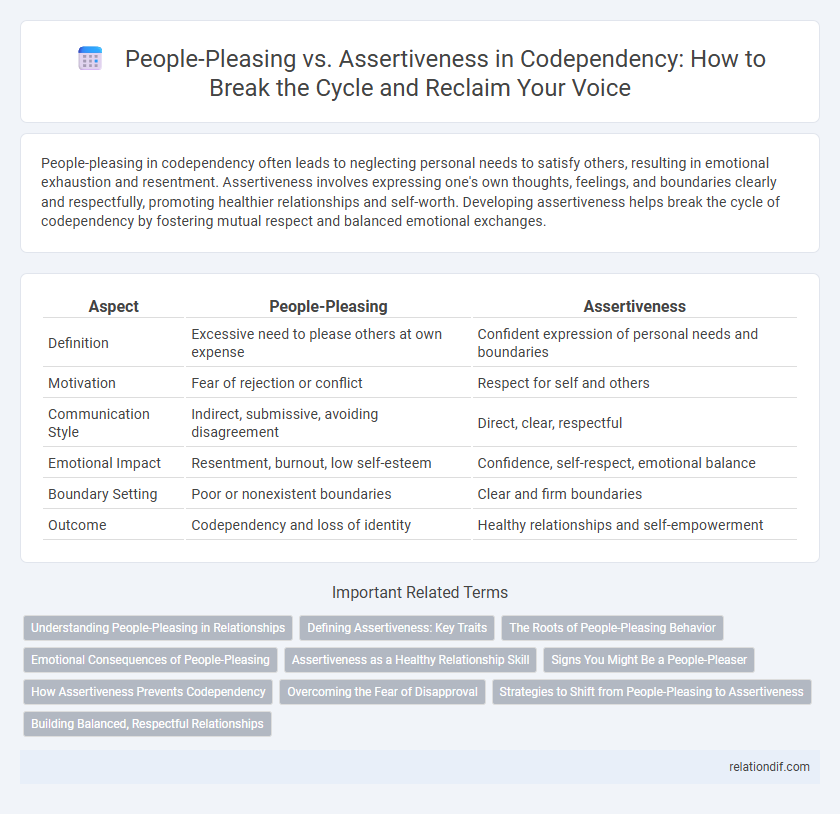People-pleasing in codependency often leads to neglecting personal needs to satisfy others, resulting in emotional exhaustion and resentment. Assertiveness involves expressing one's own thoughts, feelings, and boundaries clearly and respectfully, promoting healthier relationships and self-worth. Developing assertiveness helps break the cycle of codependency by fostering mutual respect and balanced emotional exchanges.
Table of Comparison
| Aspect | People-Pleasing | Assertiveness |
|---|---|---|
| Definition | Excessive need to please others at own expense | Confident expression of personal needs and boundaries |
| Motivation | Fear of rejection or conflict | Respect for self and others |
| Communication Style | Indirect, submissive, avoiding disagreement | Direct, clear, respectful |
| Emotional Impact | Resentment, burnout, low self-esteem | Confidence, self-respect, emotional balance |
| Boundary Setting | Poor or nonexistent boundaries | Clear and firm boundaries |
| Outcome | Codependency and loss of identity | Healthy relationships and self-empowerment |
Understanding People-Pleasing in Relationships
People-pleasing in relationships often stems from an intense desire for approval and fear of rejection, leading individuals to suppress their own needs and boundaries. This behavior can result in resentment and emotional exhaustion as personal feelings are consistently overlooked to maintain harmony. Understanding these patterns is essential for cultivating assertiveness, which promotes honest communication and mutual respect in healthy relationships.
Defining Assertiveness: Key Traits
Assertiveness involves confidently expressing one's thoughts, feelings, and needs while respecting others' boundaries, distinguishing it from people-pleasing behaviors characterized by compliance and self-sacrifice. Key traits of assertiveness include clear communication, emotional regulation, and maintaining personal integrity without aggression or passivity. Developing assertiveness enhances healthy relationships by promoting mutual respect and reducing codependent patterns.
The Roots of People-Pleasing Behavior
People-pleasing behavior often stems from deep-rooted fears of rejection and a desire for approval, conditions frequently linked to childhood experiences such as inconsistent parenting or emotional neglect. Individuals may develop this pattern as a coping mechanism to maintain emotional safety or avoid conflict, leading to difficulty asserting personal boundaries. Understanding these origins is crucial for fostering assertiveness, which encourages self-respect and balanced interpersonal relationships.
Emotional Consequences of People-Pleasing
People-pleasing often leads to emotional exhaustion, as individuals suppress their true feelings to gain approval. This chronic self-neglect fosters resentment, anxiety, and decreased self-esteem over time. In contrast, assertiveness promotes emotional well-being by encouraging honest expression and healthy boundaries.
Assertiveness as a Healthy Relationship Skill
Assertiveness is a crucial skill in healthy relationships, allowing individuals to communicate their needs and boundaries confidently without infringing on others' rights. Unlike people-pleasing, which can lead to resentment and imbalance, assertiveness fosters mutual respect and emotional honesty. Practicing assertiveness improves self-esteem and promotes emotional independence, key elements in overcoming codependency patterns.
Signs You Might Be a People-Pleaser
Constantly prioritizing others' needs over your own, feeling uncomfortable saying no, and seeking approval in every decision are common signs you might be a people-pleaser. Struggling with boundaries, experiencing anxiety about disappointing others, and suppressing personal opinions highlight a pattern of codependent behavior. Recognizing these tendencies is crucial for developing assertiveness and fostering healthier relationships.
How Assertiveness Prevents Codependency
Assertiveness establishes clear personal boundaries, promoting self-respect and reducing reliance on others' approval, which is crucial in preventing codependency. Unlike people-pleasing, assertiveness encourages honest communication and emotional independence, fostering healthier relationships. Consistent practice of assertive behaviors strengthens self-esteem and diminishes the need for external validation that fuels codependent patterns.
Overcoming the Fear of Disapproval
Overcoming the fear of disapproval is essential to shift from people-pleasing to assertiveness, allowing individuals to set healthy boundaries without guilt. Developing assertiveness enhances self-esteem and promotes authentic communication, reducing the tendency to seek external validation. Techniques such as cognitive restructuring and gradual exposure to expressing true feelings empower individuals to resist the compulsion to please at the expense of their own needs.
Strategies to Shift from People-Pleasing to Assertiveness
Setting clear boundaries, practicing saying no, and prioritizing personal needs are effective strategies to shift from people-pleasing to assertiveness. Building self-awareness through journaling and mindfulness helps identify patterns of over-accommodation and encourages authentic communication. Role-playing assertive responses and seeking feedback in supportive environments can strengthen confidence and reinforce healthy interpersonal dynamics.
Building Balanced, Respectful Relationships
People-pleasing often stems from a desire to avoid conflict, leading to suppressed personal needs and unbalanced relationships. Assertiveness involves clearly expressing thoughts and feelings while respecting others' boundaries, fostering mutual respect and trust. Developing assertiveness skills helps break codependent cycles by promoting balanced, healthy interactions where both parties feel valued.
People-Pleasing vs Assertiveness Infographic

 relationdif.com
relationdif.com